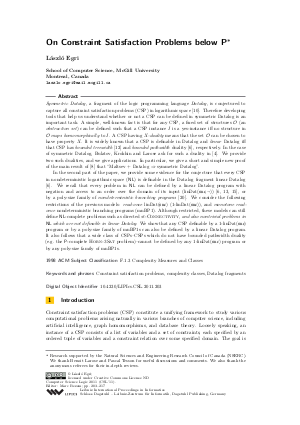On Constraint Satisfaction Problems below P*
Author László Egri
-
Part of:
Volume:
Computer Science Logic (CSL'11) - 25th International Workshop/20th Annual Conference of the EACSL (CSL 2011)
Part of: Series: Leibniz International Proceedings in Informatics (LIPIcs)
Part of: Conference: Computer Science Logic (CSL) - License:
 Creative Commons Attribution-NoDerivs 3.0 Unported license
Creative Commons Attribution-NoDerivs 3.0 Unported license
- Publication Date: 2011-08-31
File

PDF
LIPIcs.CSL.2011.203.pdf
- Filesize: 0.81 MB
- 15 pages
Document Identifiers
Subject Classification
Keywords
- constraint satisfaction problems
- complexity classes
- Datalog fragments
Metrics
- Access Statistics
-
Total Accesses (updated on a weekly basis)
0PDF Downloads0Metadata Views
Abstract
Symmetric Datalog, a fragment of the logic programming language Datalog, is conjectured to capture all constraint satisfaction problems (CSP) in L. Therefore developing tools that help us understand whether or not a CSP can be defined in symmetric Datalog is an important task. It is widely known that a CSP is definable in Datalog and linear Datalog iff that CSP has bounded treewidth and bounded pathwidth duality, respectively. In the case of symmetric Datalog, Bulatov, Krokhin and Larose ask for such a duality [2008]. We provide two such dualities, and give applications. In particular, we give a short and simple new proof of the result of Dalmau and Larose that "Maltsev + Datalog -> symmetric Datalog" [2008]. In the second part of the paper, we provide some evidence for the conjecture of Dalmau [2002] that every CSP in NL is definable in linear Datalog. Our results also show that a wide class of CSPs ---CSPs which do not have bounded pathwidth duality (e.g. the P-complete Horn-3Sat problem)--- cannot be defined by any polynomial size family of monotone read-once nondeterministic branching programs. We consider the following restrictions of the previous models: read-once linDat(suc) (1-linDat(suc)), and monotone readonce nondeterministic branching programs (mnBP1). Although restricted, these models can still define NL-complete problems such as directed st-Connectivity, and also nontrivial problems in NL which are not definable in linear Datalog. We show that any CSP definable by a 1-linDat(suc) program or by a poly-size family of mnBP1s can also be defined by a linear Datalog program. It also follows that a wide class of CSPs ---CSPs which do not have bounded pathwidth duality (e.g. the P-complete Horn-3Sat problem)--- cannot be defined by any 1-linDat(suc) program or by any poly-size family of mnBP1s.
Cite As Get BibTex
László Egri. On Constraint Satisfaction Problems below P*. In Computer Science Logic (CSL'11) - 25th International Workshop/20th Annual Conference of the EACSL. Leibniz International Proceedings in Informatics (LIPIcs), Volume 12, pp. 203-217, Schloss Dagstuhl – Leibniz-Zentrum für Informatik (2011)
https://doi.org/10.4230/LIPIcs.CSL.2011.203
BibTex
@InProceedings{egri:LIPIcs.CSL.2011.203,
author = {Egri, L\'{a}szl\'{o}},
title = {{On Constraint Satisfaction Problems below P*}},
booktitle = {Computer Science Logic (CSL'11) - 25th International Workshop/20th Annual Conference of the EACSL},
pages = {203--217},
series = {Leibniz International Proceedings in Informatics (LIPIcs)},
ISBN = {978-3-939897-32-3},
ISSN = {1868-8969},
year = {2011},
volume = {12},
editor = {Bezem, Marc},
publisher = {Schloss Dagstuhl -- Leibniz-Zentrum f{\"u}r Informatik},
address = {Dagstuhl, Germany},
URL = {https://drops.dagstuhl.de/entities/document/10.4230/LIPIcs.CSL.2011.203},
URN = {urn:nbn:de:0030-drops-32320},
doi = {10.4230/LIPIcs.CSL.2011.203},
annote = {Keywords: constraint satisfaction problems, complexity classes, Datalog fragments}
}
